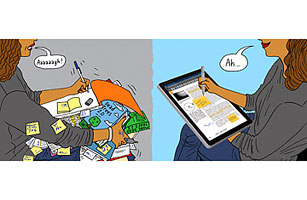
It might seem foolish for a no-name start-up to compete with Apple's wildly popular iPad for a sliver of a market that barely exists — tablet computers that display electronic textbooks. But Osman Rashid, co-founder of Kno Inc. in Santa Clara, Calif., is used to tussling with giants. Rashid's first start-up, textbook-rental site Chegg, took direct aim at the pocketbooks of old-school publishers by creating a nationwide market for secondhand textbooks. In 2010, its fourth year as a kind of Netflix for textbooks, Chegg is poised to take in sales of more than $130 million and has even turned a former rival, McGraw-Hill, into a revenue-sharing partner. "Everybody thought we would flame out and disappear, but we stuck around," notes Rashid, 40, who was born in London and raised in Islamabad.
Rashid's ability to disrupt an oligopolistic market that enjoys fat margins hasn't gone unnoticed. Kno's inaugural product is a $549 tablet with a 14-in. color touchscreen and 16 gigabytes of memory. A dual-pane model will cost $799. (Buyers can upgrade to 32 gigabytes of memory for an additional $100.) Both have software for downloading and viewing digital textbooks, which Kno plans to sell at 30%-to-50% discounts. Although the tablet won't be in students' hands until Christmas, the company has already raised some $55 million — and plenty of eyebrows. Venture capitalist Marc Andreessen, creator of the first popular Web browser, Mosaic, is Kno's largest investor and most vocal supporter. He says the Kno is a killer app: "Today's experience of buying and carrying around textbooks is awful and expensive. Other tablets can't display a textbook page because the screen is too small. The screens literally can't support the textbooks."
Actually, electronic textbooks are already available on the iPad. Students at New Jersey's Seton Hall University and elsewhere are using the free Inkling application to buy and read digital versions of five textbooks, including the best-selling Biology by Peter Raven. Students can buy the book for a hefty $150 or pay $3.99 a chapter. Inkling founder Matt MacInnis promises hundreds more titles to follow. Other iPad apps offer digital textbooks as well.
MacInnis thinks the Kno is really a Kno-go because the price is too high for a relatively dumb gadget: "Who's going to buy a $1,000 device when they can go and buy an iPad for half the price that does 10 times as many things?" Andreessen says MacInnis misses the point. "A student is comparing a Kno to a backpack of physical textbooks. They are not comparing it to an iPad," he says, adding that college students already spend an average of $800 a year on books.
What's certain is that the $4 billion college-textbook market is ripe for a digital makeover. Research firm Simba Information estimates that digital-textbook sales will soar from just 2% of the total market in 2009 to 11.5% in 2013.
For electronic textbooks to take off, however, they need to be more than glorified PDF files. The Kno will let students write class notes with a stylus, insert notes on a page and collaborate with other users via wi-fi. The two-pane version lets students hold one page in place while flipping through on the second pane to, say, hunt down a physics formula.
Critics say the Kno's large screen — the same kind that's used in the MacBook Pro notebook — makes it too big. But beta tester Darshan Shankar, a sophomore at the University of California, Berkeley, thinks otherwise. "I can read two pages of text on it without straining my eyes," he says. He also likes taking notes with the stylus: "The iPad doesn't have a stylus, so I'd have to be taking notes with my finger." Kno plans to make its browser-based software available on other tablets as well. Dozens of iPad clones have been announced for 2011.
Tailored to show digital textbooks, the Kno will almost certainly be a niche product to start, but Rashid doesn't see that as a liability. The same was true for the electronic calculator in the early 1970s. "For me, it is about customers saying it is great and recommending it to others," he says. "Kno doesn't have to sell 10 million units in a year to be a success. We do not have that kind of pressure." That's a business lesson in itself.